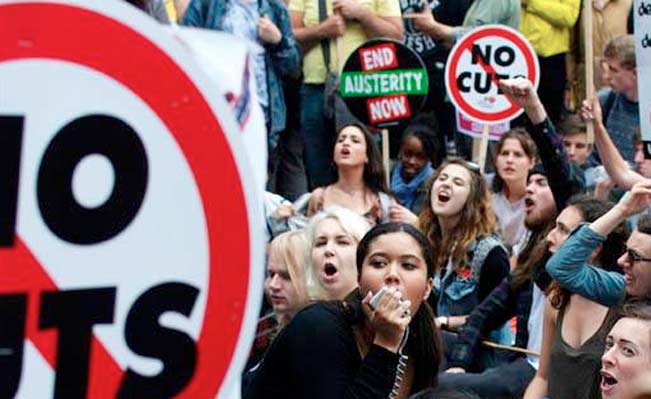 Protestors on June 20th 'End Austerity Now' protest. Photograph: Jim Aindow
Protestors on June 20th 'End Austerity Now' protest. Photograph: Jim Aindow
Saturday’s march demonstrated that the People’s Assembly is now a genuine mass movement, now we have to take it to a higher stage writes Lindsey German
There are times in any movement where it takes a qualitative step and where an event changes the way it is perceived and how people relate to it. Yesterday’s End Austerity Now demo was such a moment. The size, composition and heightened political awareness of the marchers all demonstrated that the People’s Assembly is now a genuine mass movement, capable of organising a grassroots campaign across Britain which has the potential to stop Tory policies and to challenge the government’s whole existence.
And this was a grassroots campaign par excellence. Thousands of activists booked coaches, made placards, gave out leaflets, got up at dawn to travel. People of all ages, people with disabilities, people who had to care for very young children, people who could barely afford to come to London, all made huge efforts to be there. Muslims fasting for Ramadan turned up, some of them stewarding and organising without food or drink.
A number of trade unions also gave support, including NUT, PCS, Unite, CWU and the Firefighters. Celebrities turned up. All of this was in my view welcome, given the difficulty of publicising and financing demos, as was the support of the Mirror newspaper which urged its readers to demonstrate. The demo would have happened, and been very large, even without all that support, but it wouldn’t have been as large and it wouldn’t have reached so many people.
It was a very diverse demo with lots of young people on it – a great sign that those increasingly targeted by the Tories are not going to stand for it. It was also quite working class, reflecting the fact that already austerity is biting in the working class communities across the country.
The potential is now there to make a splash on Budget Day, July 8th, but to do two other vital things. The first is to build the People’s Assembly movement as broadly and widely as possible. Every town and city should strengthen their groups of set up new ones where there are none. In the weeks after the demo there should be mass People’s Assemblies everywhere which discuss appropriate action in every locality and how to bring diverse anti austerity campaigns together in joint activity. One of the key tasks is building solidarity with some important strikes taking place, or projected such as the London tube strike.
The second is to lay siege to the Tories in Manchester at their conference in October. There should be four days of protest which shakes a governing party committed to worsening the lives of millions and enriching the tiny number of rich even further.
The BBC is asking why we are protesting so soon after an election where the Tories won a majority. The answers are simple: they have little authority in the big cities of England, or in Scotland where austerity was rejected electorally. They were elected, in any case, on only a quarter of those who could potentially vote. Osborne’s budget is certain to contain nasty surprises of the sort that – if they had been put to the electorate – would almost certainly have been rejected.
The demo was called long before the election, on the basis that whoever won, a fight against austerity would be needed. It exceeded expectations, but would have been very large even with a Labour government or coalition.
Much of the message of yesterday was that this is just the start of a mass campaign. To those who say that one demo is not enough: that is true and was a point made repeatedly by speakers yesterday. But without that demo the movement would not have risen to a higher plane, would not have had a national voice, would not have linked different campaigns and geographical areas together. The long period of defeat of the left and its current fragmentation leads to cynicism on the part of some people. Even when they enjoyed being on a mass vibrant demo, they had to quickly remind themselves that they really didn’t want to be happy and that nothing would change. They fail to see what changed yesterday: hundreds of thousands of people, supported by many more, stood up to government policy in the most vocal and principled way.
A new left will be formed out of those who understand this distinction, and who also see the need to continue building this mass movement. It will be built by those who link this movement with wider solidarity around strikes, anti racism and other campaigns. Some of us argued that there needed to be a mass united front against austerity built in 2008 when the recession began. We were in a small minority and it didn’t happen, or not on a sufficiently large scale. We would be much further forward today if more of the left had built it earlier. But we are moving forward again. Yesterday that movement came of age. Now we have to take it to a higher stage still and organise to defeat the government.

